BY DAVID MERMELSTEIN
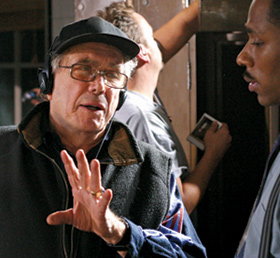 ACTING UP: Saregent directed a run of critically acclaimed
ACTING UP: Saregent directed a run of critically acclaimed
films for HBO, including Something the Lord Made.Surely a veteran director like Joseph Sargent—a nine-time DGA Award nominee and three-time winner—has seen it all. Yet even he was surprised by some of the challenges presented by his latest project, Sweet Nothing in My Ear, a made for television movie starring Jeff Daniels and Marlee Matlin as loving parents—she's deaf; he's not—who come down on different sides of the debate over a cochlear implant for their son. Indeed, getting the story to the screen in a manner both comprehensible to hearing viewers and in a context recognizable to the deaf community proved unexpectedly complicated.
Sargent's previous movies for TV, some 45 of them, made him a natural for Sweet Nothing. He has regularly been drawn to projects possessing what he calls "edge," material "that can make some comment or contribution to the condition of man. I am somehow pulled to social justice," he says.
But his first assignments in TV were not so high-minded. After studying acting with Lee Strasberg and Stella Adler, where he learned to "dig into the emotional underpinnings" of the character, he found that directing was his calling and formed a small theater company with a few of his colleagues. He was anxious to get into directing films and his big break came with a chance to do an episode of Lassie.
"Now, mind you, the things I was directing [for the stage] was everything from Ionesco to O'Casey to Shakespeare—some pretty profound stuff," Sargent recalled in a 2004 interview for the DGA's Visual History Program. "So what was my first TV show? Lassie. But hey, it was a break, and I was thrilled... It was the best thing that could happen to any director because nobody in the industry watched a kid's show in its seventh year. So I got to do all my mistakes, all my learning process, in the right place."
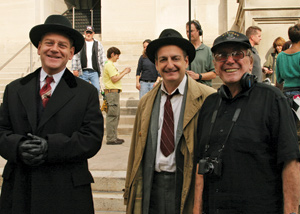 Warm Springs (HBO)
Warm Springs (HBO)But Sargent says his best training came on a mid-'60s spy show called The Man from U.N.C.L.E. shot on the MGM lot. "It was absolutely unfettered by any parameters whatsoever," Sargent recalled fondly in his DGA interview. "We could do anything we wanted. We would look around the backlot and see what sets were available and then write something for a French street or a showboat. We had the richness of all those years of MGM musicals and epics to choose from. I even had a dance crane I could play with and go for different angles and crazy stuff. You go through the stage as a director where you want to push the envelope and try everything you can."
Sargent went on to direct a number of features, most notably The Taking of Pelham One Two Three (1974) and MacArthur (1977), but at a certain point made the decision to stick mostly with movies for television. "I immediately started turning down B-quality theatricals for A-quality material, the movies for which I'm now identified," says Sargent.
It was a daring decision at a time when there was a stigma about working in television for directors who already had a feature career. But Sargent saw little difference between features and movies made for television. "We used the same camera, the same film, the same crew and in most cases, the same actors. And we had the same stresses and the same pressures," Sargent said in his DGA interview.
In his own way, Sargent was fighting for people who have been silenced or deprived of their rights unfairly. But making films that dealt with injustice was not always easy on a personal level. Filming the Holocaust drama Out of the Ashes (2003) in Auschwitz and "to see the smoke coming from the chimneys and the ladies lined up for inspection was unsettling and everybody felt it," Sargent told the DGA. And similarly in Miss Evers' Boys (1997), he chronicled the infamous Tuskegee syphilis study. "It's tough sometimes. The content makes you so uncomfortable that you have to transcend your feelings and get into a neutral place to stay objective."
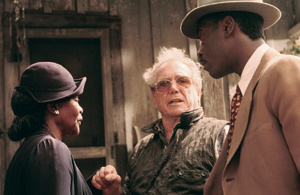 A Lesson Before Dying (HBO)
A Lesson Before Dying (HBO)Sargent sees the abundance of quality films made by cable TV up until a few years ago as part of a second golden age of television. During this time, he made a string of critically acclaimed films for HBO, including A Lesson Before Dying (1999), about a black man wrongly accused of murdering a white store owner in the 1940s South; Something the Lord Made (2004), which trumpeted a black lab technician's largely unsung contributions to heart surgery; and Warm Springs (2005), the story of Franklin Roosevelt's struggle with polio. "[The cable companies] were doing content that was rather remarkable," says Sargent. "It was adult, edgy and chance-taking, and socially and politically very challenging."
Beyond his general appreciation for socially conscious filmmaking, Sargent was an ideal choice for Sweet Nothing in My Ear because of a long-running association with the deaf community dating back to his direction of Love Is Never Silent (1985), a groundbreaking TV movie that used deaf actors and focused on deaf life. It also earned Sargent an Emmy. In addition, he has long been involved with Deaf West Theater, a nationally recognized innovative troupe based in North Hollywood.
Such history doubtless appealed to Stephen Sachs, who wrote Sweet Nothing based on his play of the same name. Sachs had sought the counsel of Ed Waterstreet, Deaf West's founder and one of the deaf stars of Love Is Never Silent, and the actor referred him to Sargent. Sargent liked Sachs' script and brought it to Hallmark, where he had directed five films, confident that his familiarity with—and sensitivity to—the deaf community and its issues would prove assets. And so they were, but not to the degree he first assumed. In fact, the toughest dilemmas related specifically to deaf concerns, testing both Sargent's directorial and diplomatic skills. But none of that was apparent during filming, which the director maintains went very smoothly.
"There was marvelous camaraderie," says Sargent. "We had the top ASL [American Sign Language] masters working with us, so there was never a moment when there weren't flying hands—constant communication directly to the actor. There was no delay. It was like the [deaf] actors could hear everything."
Naturally, some adjustments had to be made regarding things like blocking. But thanks to Sargent's previous work with deaf actors, that was anticipated. "Two hearing actors not looking at one another is perfectly normal," Sargent notes. "But you can't do that with deaf actors. They have to be in each other's eye line. That's the second thing you learn: staging with deaf actors is a whole other dimension."
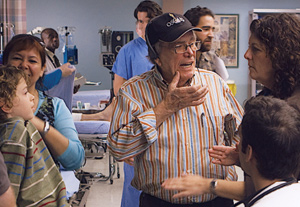 MOVIE TALK: With the help of sign language experts, Sargent
MOVIE TALK: With the help of sign language experts, Sargent
communicated easily with his actors.Not that Sargent didn't learn a thing or two this time around. He laughs as he relates how occasionally even an old hand like him failed to see the obvious impossibility of his directions. In one scene, Matlin and her mother are chatting after shopping. "I wanted more bags, for visual reasons," the director recalls, not thinking that with their hands full they wouldn't be able to communicate. "Marlee said, 'Okay, so now how do I tell her what happened?' Marlee challenged a lot of that stuff."
But Sargent's real challenges surfaced when a decision had to be made about how deaf speech—that is, sign language—would be translated for hearing viewers. The options were subtitles and voiceover, and both held pitfalls.
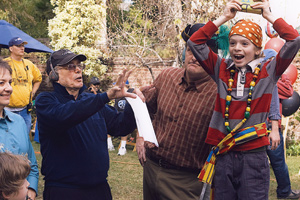 Sargent with Noah Valencia on set of Sweet Nothing in My Ear.
Sargent with Noah Valencia on set of Sweet Nothing in My Ear."The big question," Sargent says, "was whether disembodied voices would work. But we had to wait until the film was completed to figure that out." In the end, the finished picture employed various techniques to make signing comprehensible to hearing audiences. Sargent describes the most familiar as "the rule that when there's a hearing person in the environment, it necessitates Jeff interpreting for Marlee, as he would in life, because that follows logically."
One could call this approach the Children of a Lesser God principle, because it's the method used by Mark Medoff in his play and the subsequent screenplay for the 1986 film for which Matlin won an Academy Award. "Medoff wrote the technique of the hearing partner always managing to interpret for the audience," says Sargent referring to Children, "so that while, say, Marlee was signing, William Hurt was translating. You had a voice doing it, which is what we have in this film as well."
But though it made sense for Daniels to speak what Matlin signs when a non-ASL reader was in a scene, Sargent was troubled by the illogic of employing the technique in his film's more intimate moments.
"In those events when Jeff and Marlee are alone," he says, "with no one necessitating any need for interpreting, they are basically signing to each other. In life, of course, they would just be signing. But for our purposes, as a hearing audience, we use the convention of a voiceover."
At first, it seemed that subtitles might be used to "translate" the movie's intimate exchanges. But after screening the film with subtitles, Sargent dismissed the option. "When you're watching foreign films," he says, "you're hearing the language even though you don't understand it. The emotional content is contained in the voice, and with the subtitles, you piece it together. That's missing when you're dealing with deaf actors. And this is something we had to learn."
Sargent, as well as all the deaf actors, including Matlin, were initially upset about what they saw as the intrusiveness of voiceover. "We were all a little pissed," recalls Sargent. "Marlee hated it. She said, 'We are not cartoons you put voices over.'"
But once she recognized the ineffectiveness of using subtitles and he assured her that the nuances of her performance could be preserved, Sargent says she agreed with the decision. In the end "we believed this was the most elegant way to inform the audience when two deaf people sign and there's nobody to speak the sign language," he says.
The effect is much like listening to NPR when, say, the Saudi oil minister starts speaking in Arabic and then the volume goes down and another voice speaking in English is superimposed. The difference in Sweet Nothing is that there's no aural speech occurring in these scenes, there's signing and then the voice comes in. The technique is not meant to be the character's internal dialogue, but a translation of what the character is signing.
But it was still necessary to find voices with the right qualities to match the personal and physical traits of the deaf actors, and that wasn't always easy. "We had to audition quite a few voices," says Sargent. "A tough one to fit was Ed Waterstreet, who is chunky, very masculine-looking and strong. We went through quite a few actors until we found the right voice, one you had no trouble putting in the same body as his."
There was also the synchronization issue. Because certain deaf actors, including Matlin and Waterstreet, possess some hearing and speech, they tend to mouth words when signing, and the effect can be disconcerting with voiceover.
"I wasn't aware of how much mouthing they did," says Sargent. "So that was a bit of a problem. In the case of Marlee, we had to purposely come in with the voice after she begins signing, to make that clear. The editor who was trying to synch her up found that doing that didn't really work."
But even after Sargent came to appreciate the virtues of voiceover, he wasn't pushing for its unremitting use. He speaks with particular pride of his film's judicious use of silence. "I insisted there be no voice," he says of a scene depicting how Adam (Noah Valencia), the child at the center of the film's debate, perceives his birthday party. "Silence is a major character in this piece and in the deaf community."
This being a Hallmark production, Sweet Nothing in My Ear concludes happily. What's interesting is that Sargent, by his own admission, overshot the mark, lending the ending "more schmaltz than it needed." Ironically, it was Hallmark—about as sentimental a sponsor as there is—who suggested pulling back. "The first version tipped it all too soon," the director reluctantly acknowledges of his original ending. And though he admits, "I fought it like crazy," Sargent eventually agreed. "After all these years, the things you learn!"